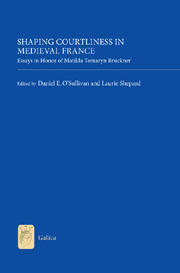Book contents
- Frontmatter
- Contents
- List of Illustrations
- Acknowledgements
- Introduction
- Matilda Tomaryn Bruckner: A Bibliography
- Part I Shaping Real and Fictive Courts
- Part II Shaping Courtly Narrative
- Part III Shaping Women's Voices in Medieval France
- Lombarda's Mirrors: Reflections on PC 288,1 as a Response 165 to PC 54,1
- Na Maria: Courtliness and Marian Devotion in Old Occitan Lyric
- From Convent to Court: Ermengarde d'Anjou's Decision to Reenter the World
- From Chrétien to Christine: Translating Twelfth-Century Literature to Reform the French Court during the Hundred Years War
- Part IV Shaping the Courtly Other
- Envoi
- List of Contributors
- Index
- Tabula Gratulatoria
- Already Published
From Chrétien to Christine: Translating Twelfth-Century Literature to Reform the French Court during the Hundred Years War
from Part III - Shaping Women's Voices in Medieval France
Published online by Cambridge University Press: 05 May 2013
- Frontmatter
- Contents
- List of Illustrations
- Acknowledgements
- Introduction
- Matilda Tomaryn Bruckner: A Bibliography
- Part I Shaping Real and Fictive Courts
- Part II Shaping Courtly Narrative
- Part III Shaping Women's Voices in Medieval France
- Lombarda's Mirrors: Reflections on PC 288,1 as a Response 165 to PC 54,1
- Na Maria: Courtliness and Marian Devotion in Old Occitan Lyric
- From Convent to Court: Ermengarde d'Anjou's Decision to Reenter the World
- From Chrétien to Christine: Translating Twelfth-Century Literature to Reform the French Court during the Hundred Years War
- Part IV Shaping the Courtly Other
- Envoi
- List of Contributors
- Index
- Tabula Gratulatoria
- Already Published
Summary
Throughout her entire œeuvre, comprising over forty titles, the Venetian-born poet and moralist Christine de Pizan (1364/5–ca. 1430) attempts to shape courtly ideals in some way or other as part of her larger program to enlighten her adoptive country of France during one of the darkest phases in its history. In attempting literally to educate her compatriots out of their crisis, her incorporation of classical-antique and Italian-humanistic wisdom – mostly through contemporary translations, including her own, from Latin or Italian into French – has benefited from abundant scholarly investigation in recent years. Such findings also confirm her ability to integrate authoritative texts quite ingeniously, rather than simply harvesting and inserting them into her own, often adding her feminine perspective, as essential aspects of her distinctive message. More specifically, scholars point to Christine's rediscovery and implementation of antique learning, in her native culture's civic-humanistic mode, toward improving France's moral-political situation as evidence of her own brand of vernacular humanism. In this pursuit she displays more prescience than her male colleagues supposedly privileged by their Latinity, since she, as supposedly Latin-deprived, would foresee and promote the triumph of the vernacular as France's literary and philosophical language.
- Type
- Chapter
- Information
- Shaping Courtliness in Medieval FranceEssays in Honor of Matilda Tomaryn Bruckner, pp. 213 - 226Publisher: Boydell & BrewerPrint publication year: 2013



